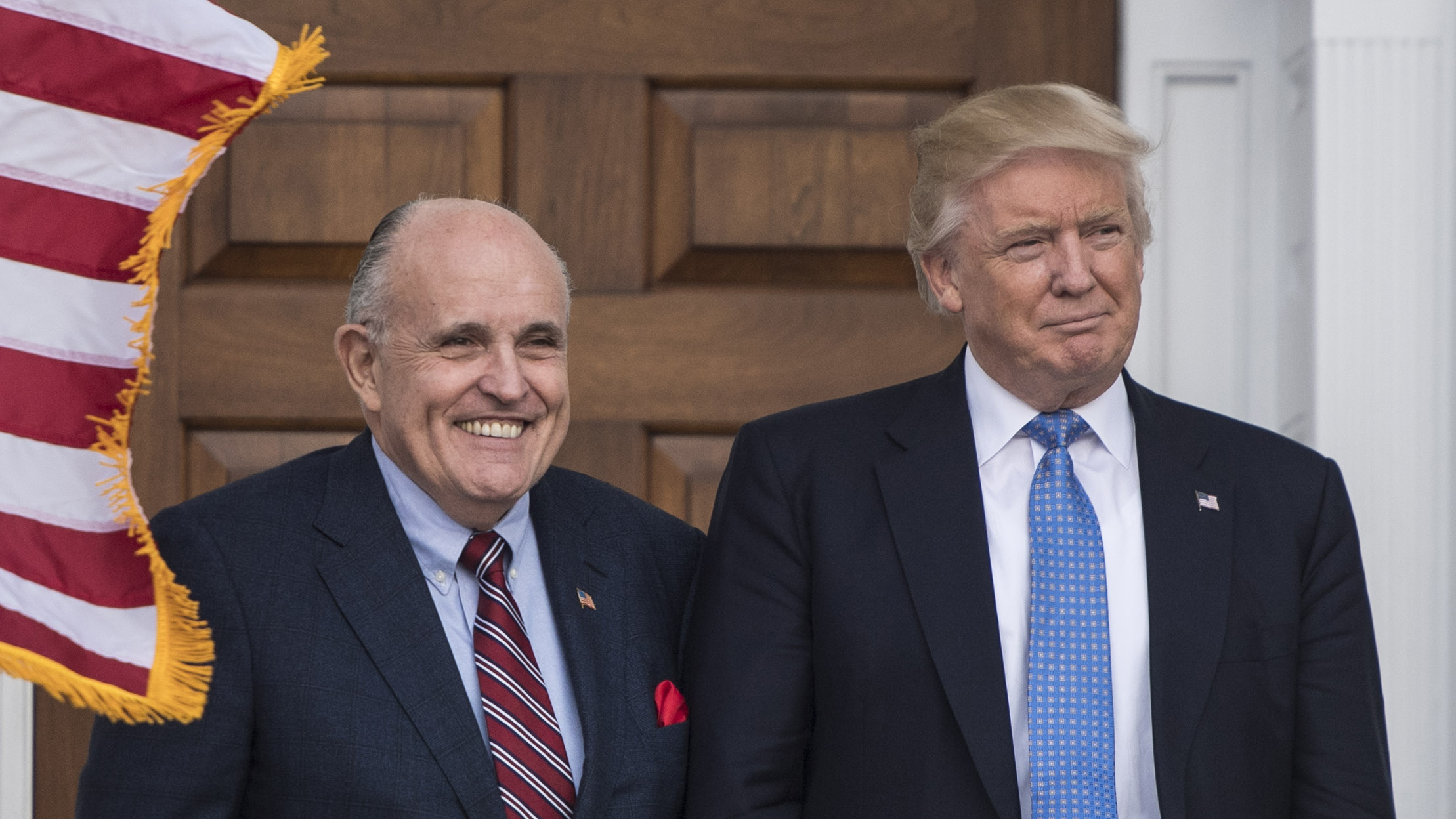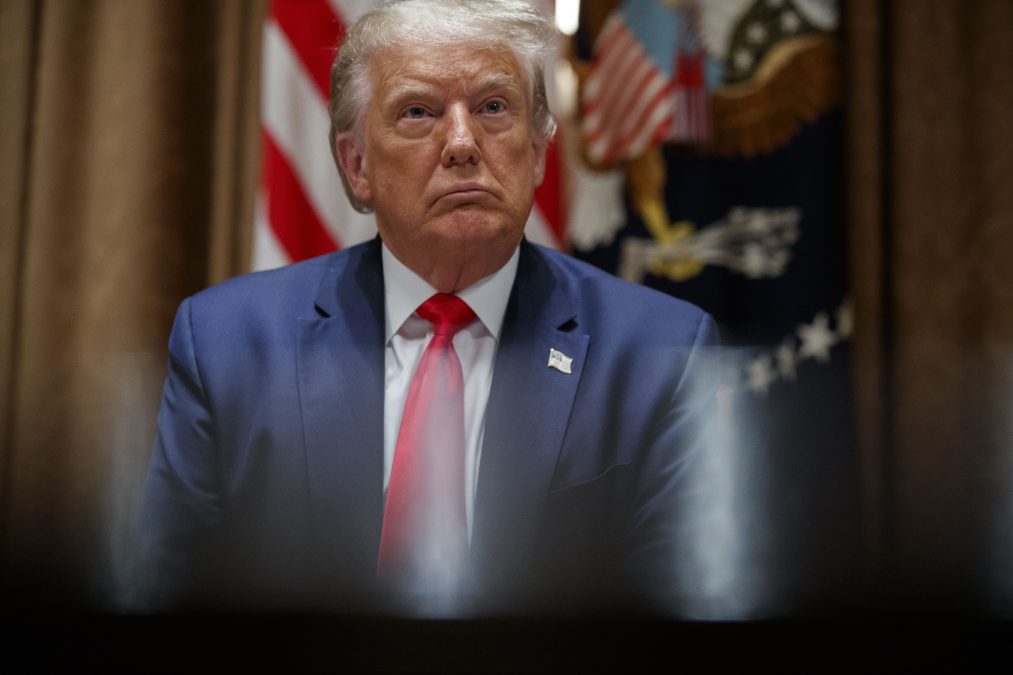Donald Trump and 18 other associates were charged Monday in Georgia as part of a sweeping indictment alleging they schemed to illegally overturn his 2020 election loss and stop the peaceful transition of power.
The indictment, brought by Fulton County District Attorney Fani Willis, follows an investigation that lasted more than two years and marks the fourth criminal case brought against the former president.
Those charged in Monday’s indictment face a slew of charges, including racketeering, violating the oath of a public officer, forgery, false statements and other offenses. Prosecutors say they must all surrender to authorities by Aug. 25.
Here’s a look at the 19 defendants charged in the indictment:
Donald Trump:
Then-President Donald Trump fixated on Georgia after the 2020 general election, refusing to accept his narrow loss in the state and making unfounded assertions of widespread election fraud there. He also called top state officials, including Gov. Brian Kemp, to urge them to find a way to reverse his loss in the state. In a Jan. 2, 2021, phone call with Georgia Secretary of State Brad Raffensperger, Trump suggested the state’s top elections official could help “find” the votes needed for him to win the state. Fulton County District Attorney Fani Willis opened an investigation into possible illegal attempts to influence the election shortly after a recording of that call was made public.
Get Tri-state area news delivered to your inbox. Sign up for NBC New York's News Headlines newsletter.
Rudy Giuliani:
During several legislative hearings at the Georgia Capitol in December 2020, the former New York mayor and Trump attorney promoted unsupported allegations of widespread election fraud in Georgia. Prosecutors have said Rudy Giuliani was also involved in a plan to have 16 Georgia Republicans serve as fake electors, falsely swearing that Trump had won the 2020 presidential election and declaring themselves the state’s “duly elected and qualified” electors.
John Eastman:
A former dean of Chapman University law school in Southern California, John Eastman, one of Trump’s lawyers, was deeply involved in some of his efforts to remain in power after the 2020 election. He wrote a memo arguing that Trump could remain in power if then-Vice President Mike Pence overturned the results of the election during a joint session of Congress where electoral votes would be counted. That plan included putting in place a slate of “alternate” electors in seven battleground states, including Georgia, who would falsely certify that Trump had won their states.
Mark Meadows:
Trump’s chief of staff visited Cobb County, in the Atlanta suburbs, while state investigators were conducting an audit of the signatures on absentee ballot envelopes in December 2020. Mark Meadows obtained the phone number of the chief investigator for the secretary of state’s office, Frances Watson, and passed it along to Trump, who called her. He also participated in the Jan. 2, 2021, phone call between Trump and Georgia Secretary of State Brad Raffensperger.
Sidney Powell:
A lawyer and staunch Trump ally, Sidney Powell was part of a group who met at the South Carolina home of conservative attorney Lin Wood in November 2020 “for the purpose of exploring options to influence the results of the November 2020 elections in Georgia and elsewhere,” prosecutors have said. Wood, who’s licensed in Georgia, said Powell asked him to help find Georgia residents to serve as plaintiffs in lawsuits contesting the state’s election results. Additionally, emails and documents obtained through subpoenas in an unrelated lawsuit have shown that Powell was involved in arranging for a computer forensics team to travel to rural Coffee County, about 200 miles southeast of Atlanta, to copy data and software from elections equipment there in January 2021.
Kenneth Chesebro:
Prosecutors have said Kenneth Chesebro, an attorney, worked with Georgia Republicans in the weeks after the November 2020 election at the direction of Trump’s campaign. Chesebro worked on the coordination and execution of a plan to have 16 Georgia Republicans sign a certificate declaring falsely that Trump won and declaring themselves the state’s “duly elected and qualified” electors.
Jeffrey Clark:
A U.S. Justice Department official who championed Trump’s false claims of election fraud, Jeffrey Clark presented colleagues with a draft letter pushing Georgia officials to convene a special legislative session on the election results, according to testimony before the U.S. House committee that investigated the Jan. 6, 2021, Capitol riot. Clark wanted the letter sent, but Justice Department superiors refused.
Jenna Ellis:
The lawyer appeared with Rudy Giuliani at a Dec. 3, 2020, hearing hosted by state Republican lawmakers at the Georgia Capitol during which false allegations of election fraud were made. Jenna Ellis also wrote at least two legal memos to Trump and his attorneys advising that Pence should “disregard certified electoral college votes from Georgia and other purportedly ‘contested’ states” when Congress met to certify the election results on Jan. 6, 2021, prosecutors have said.
Ray Smith:
A Georgia-based lawyer, Ray Smith was involved in multiple lawsuits challenging the results of the 2020 election in Georgia. He also gathered witnesses to provide testimony before Georgia legislative subcommittee hearings held in December 2020 on alleged issues with the state’s election.
Robert Cheeley:
A Georgia lawyer, Robert Cheeley presented video clips to legislators of election workers at the State Farm Arena in Atlanta and alleged the workers were counting votes twice or sometimes three times. He spoke to the lawmakers after Giuliani.
Michael Roman:
A former White House aide who served as the director of Trump’s election day operations, Michael Roman was involved in efforts to put forth a set of fake electors after the 2020 election.
David Shafer:
The chairman of the Georgia GOP, Shafer was one of 16 state Republicans who met at the state Capitol on Dec. 14, 2020, to sign a certificate declaring falsely that Trump had won and also declaring themselves the state’s “duly elected and qualified” electors. He also joined Trump in a lawsuit challenging the certification of the 2020 election in Georgia.
Shawn Still:
He was one of 16 Georgia Republicans who signed a certificate falsely stating that Trump had won the state and declaring themselves the state’s “duly elected and qualified” electors. Shawn Still was the finance chairman for the state GOP in 2020 and served as a Georgia delegate to the Republican National Convention that year. He was elected to the Georgia state Senate in November 2022 and represents a district in Atlanta’s suburbs.
Stephen Cliffgard Lee:
Prosecutors say Stephen Cliffgard Lee, a pastor, worked with others to try to pressure Georgia election worker Ruby Freeman and her daughter after Trump and his allies falsely accused them of pulling fraudulent ballots from a suitcase during the vote count. Lee allegedly knocked on Freeman’s door, frightening her and causing her to call 911 three times, prosecutors said in a court filing last year.
Harrison William Prescott Floyd:
Also known as Willie Lewis Floyd III, he served as director of Black Voices for Trump, and is accused of recruiting Lee to arrange a meeting with Freeman and Chicago-based publicist Trevian Kutti.
Trevian C. Kutti:
Prosecutors allege publicist Trevian C. Kutti claimed to have high level law enforcement connections. They say Freeman met with Kutti at a police precinct, where she brought Floyd into the conversation on a speakerphone. Prosecutors say Kutti presented herself as someone who could help Freeman but then pressured her to falsely confess to election fraud.
Cathy Latham:
One of 16 Georgia Republicans who signed a certificate falsely stating that Trump had won the state and declaring themselves the state’s “duly elected and qualified” electors, Cathy Latham was also chair of the Coffee County Republican Party. She was at the county elections office for much of the day on Jan. 7, 2021, and welcomed a computer forensics team that arrived to copy software and data from the county’s election equipment in what the secretary of state’s office has said was “unauthorized access” to the machines.
Scott Graham Hall:
An Atlanta-area bail bondsman, Scott Graham Hall was allegedly involved in commandeering voting information that was the property of Dominion Voting Systems from Coffee County, a small south Georgia jurisdiction. Also charged in the scheme were Powell, Latham and former county elections supervisor Misty Hampton.
Misty Hampton:
She was the elections director in Coffee County. Misty Hampton was present in the county elections office on Jan. 7, 2021, when a computer forensics team copied software and data from the county’s election equipment. She also allowed two other men who had been active in efforts to question the 2020 election results to access the elections office later that month and to spend hours inside with the equipment.
___
Cooper reported from Phoenix.



